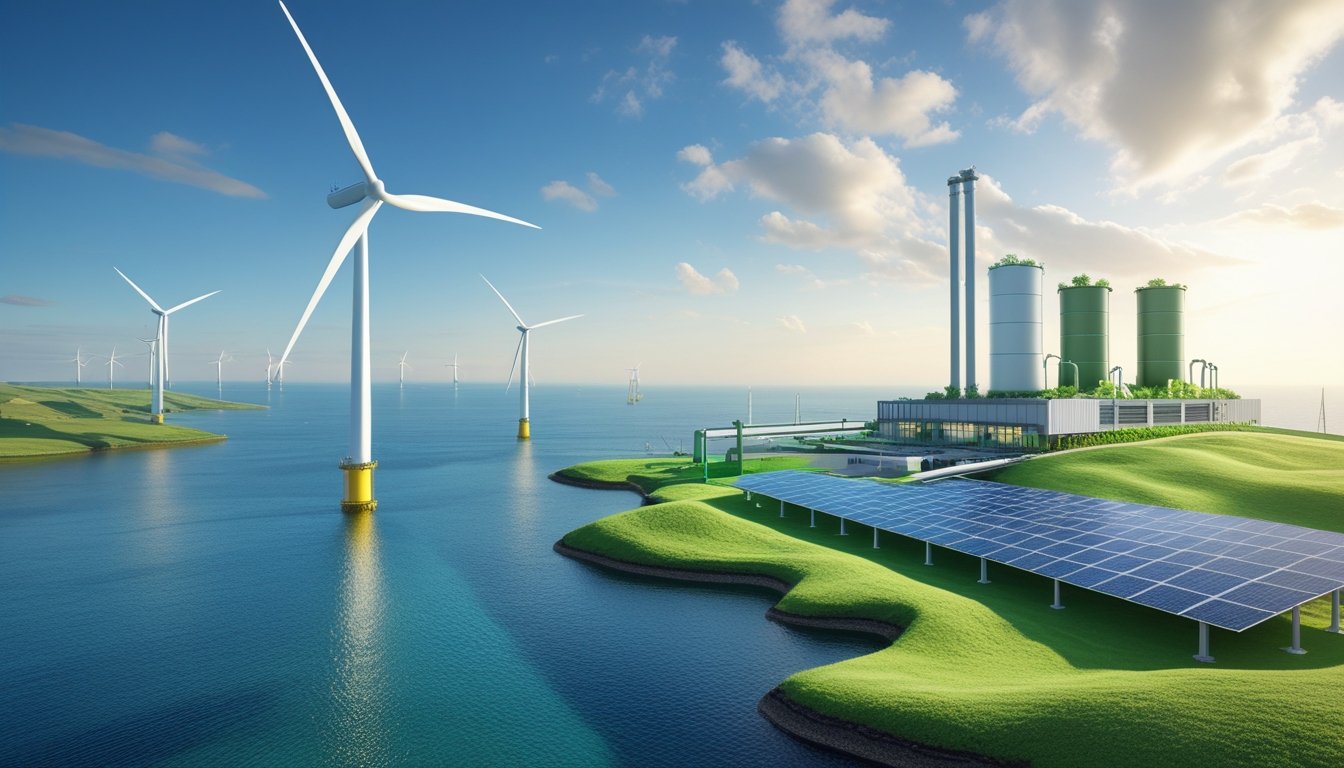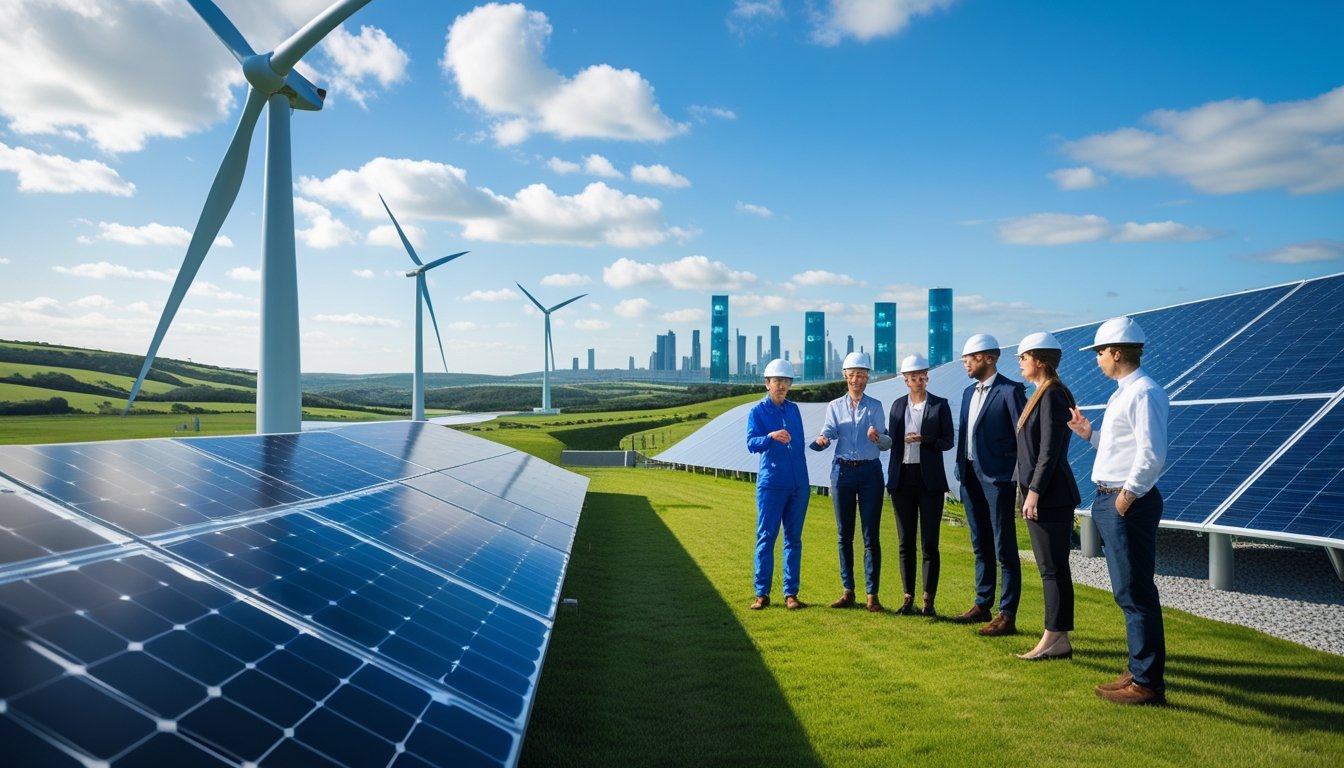Late updated: 01 Nov 2025 10:11
Written by: Eleanor Hartman
Future UK Clean Energy Innovations Unveiled: A Path to Sustainability
The United Kingdom stands on the brink of a transformative era in clean energy, characterised by innovative breakthroughs that promise to redefine the country's energy landscape. The government's commitment to clean energy is paving the way for significant advancements in renewable technologies and infrastructure. As we explore these cutting-edge innovations, it's clear that the nation's energy strategy is designed to propel the UK towards a sustainable and energy-efficient future.

With initiatives ranging from large-scale renewable projects to strategic investments in AI technologies, the UK is set to create a robust clean energy economy. These efforts not only promise economic growth but also aim to bolster the nation's role in the global clean energy movement. As we delve into these innovations, we see a promising trajectory that offers both environmental benefits and economic opportunities.
Through government support, increased investment, and a focus on technological advancement, the UK is positioning itself as a leader in clean energy. This commitment is vital as we move towards energy independence and a sustainable future. The following sections will uncover more about these innovations and their impact on our energy sector.
Key Takeaways
- UK's commitment to clean energy drives technological innovation.
- Significant investments are boosting the clean energy economy.
- Strategic impact enhances UK’s role in global energy efforts.
Groundbreaking UK Clean Energy Innovations for the Future
In the UK, the future of clean energy promises exciting developments that use cutting-edge technologies. These innovations harness artificial intelligence, advance solar and wind technology, and enhance energy infrastructure to support sustainability goals.
Pioneering Use of AI in Clean Energy Solutions
Artificial Intelligence has emerged as a pivotal player in the clean energy sector. Recent projects, like the Manchester Prize finalists, demonstrate AI’s potential to optimise energy consumption and reduce costs for households. AI innovations enable precise energy demand forecasting, which is essential for reliable energy distribution and reducing waste.
AI’s role extends beyond basic operations to creating adaptive energy systems. These systems adjust in real-time, providing flexibility and resilience to energy networks. This adaptability is crucial for balancing renewable energy sources, which can be unpredictable. The synergy between AI and clean energy is exemplified by projects supported by initiatives like Challenge Works, pushing boundaries to maximise efficiency and innovation.
Advancements in Wind and Solar Technologies
Wind and solar technologies are rapidly evolving, showcasing exceptional potential in meeting future energy needs. Offshore wind farms are being expanded, harnessing stronger and more consistent winds to produce electricity. The UK's commitment to these projects underlines our role as a leader in sustainable energy.
Onshore wind and solar farms are also experiencing technological advancements. New materials and engineering techniques increase energy capture and durability, making these systems more reliable. With Great British Energy playing a pivotal role, investment in these technologies continues to drive down costs while increasing efficiency.
These improvements contribute directly to our net-zero carbon targets. By integrating enhanced technologies, we secure cleaner, more affordable energy for the future.
Revolutionising Energy Infrastructure and Grid Stability
Upgrading energy infrastructure is vital to support the influx of renewable sources and the fluctuating supply they bring. Renewable energy integration challenges traditional grid models, necessitating intelligent solutions for grid stability.
We're investing in technologies that facilitate efficient energy storage and distribution. This includes developing new battery systems and smart grids that provide real-time data. Such advancements enhance resilience, ensuring that energy is consistently available even during peak demands.
By reinforcing infrastructure, we increase grid adaptability and prepare for future innovations. This comprehensive approach enables us to accommodate growing clean energy sources and bolster energy security across the nation.
Investment, Incentives, and Strategic Impact on UK Clean Energy

In the United Kingdom, clean energy investment and strategic initiatives are catalysing substantial economic and environmental benefits. By leveraging comprehensive plans and incentives, we are seeing a strong drive towards a sustainable and resilient energy future.
Clean Energy Investment and the Clean Energy Industries Sector Plan
The Clean Energy Industries Sector Plan, unveiled by the UK government, aims to double investment in the clean energy sector by 2035. With an anticipated annual investment of over £30 billion, this ambitious roadmap is developed in collaboration with industry leaders and stakeholders. This significant financial commitment not only aims to reduce carbon emissions but also seeks to fortify the nation's energy security.
The plan focuses on both maintaining existing technologies and nurturing emerging innovations like electric vehicles and hydrogen. This comprehensive approach underscores the government's dedication to positioning the UK as a global clean energy superpower, reinforcing our drive toward environmental and economic sustainability.
Building Local Supply Chains and Creating Jobs
A vital aspect of the nation's clean energy strategy is the strengthening of local supply chains. By investing in manufacturing facilities and critical components for industries like offshore wind, we anticipate a dramatic increase in domestic job opportunities. The government's initiative to direct £300 million in early investments through Great British Energy is a standout measure.
Creating jobs in clean energy industries not only invigorates the local economy but also provides stability and long-term employment prospects in rural and urban areas alike. This focus on job creation reflects a strategic alignment between economic policy and sustainable growth, signifying a substantial multiplier effect throughout the UK's economy.
Government Initiatives and Community Benefits
Government-led initiatives are enabling community-level benefits through strategic investments and incentive programmes. The establishment of Community Benefit Funds ensures that local areas see direct advantages from nearby energy developments. These funds are instrumental in reducing energy bills and fostering community development projects, leading to increased public support and participation in clean energy transitions.
Moreover, the introduction of a Clean Industry Bonus signifies a rewarding emphasis on environmental stewardship. By financially incentivising sustainable practices, the government is effectively nurturing a culture of green innovation and responsibility, which brightens the horizon for future generations.
Frequently Asked Questions

The UK is rapidly innovating in the clean energy sector, aligning its strategies with global advances. Government support is evident through policies and investments, while businesses play a pivotal role in this transformation.
What are the latest advancements in renewable energy technology in the UK?
Recent innovations highlight ground-breaking developments in solar panels, smart energy systems, and sustainable heating solutions. These technologies are crucial in driving the country's progress towards net-zero emissions.
How is the UK government supporting the development of clean energy?
The UK government has laid out ambitious plans, such as the Clean Power 2030 Action Plan, and the revised National Policy Statements, concentrating on collaboration and significant investments to bolster clean energy infrastructure.
What are the projected impacts of new clean energy projects on the UK's carbon emissions?
These projects aim to substantially reduce carbon emissions by transforming the energy landscape. The implementation of AI innovations and large-scale renewable energy projects is expected to lower energy costs and emissions.
Which companies are leading in clean energy innovation in the UK?
Several UK-based enterprises are spearheading clean energy innovations. These companies are making strides in diverse areas, from energy storage solutions to pioneering solar technology.
How do new clean energy innovations in the UK compare with global trends?
The UK stands amongst elite nations in clean energy advancements, aligning closely with international trends. Its ambitious goals and cutting-edge technologies are creating a competitive edge on the global stage.
What are the main challenges facing the implementation of clean energy innovations in the UK?
Challenges include lengthy connection waits due to outdated processes and ensuring adequate investment. Addressing these hurdles is key to realising the country's clean energy potential.